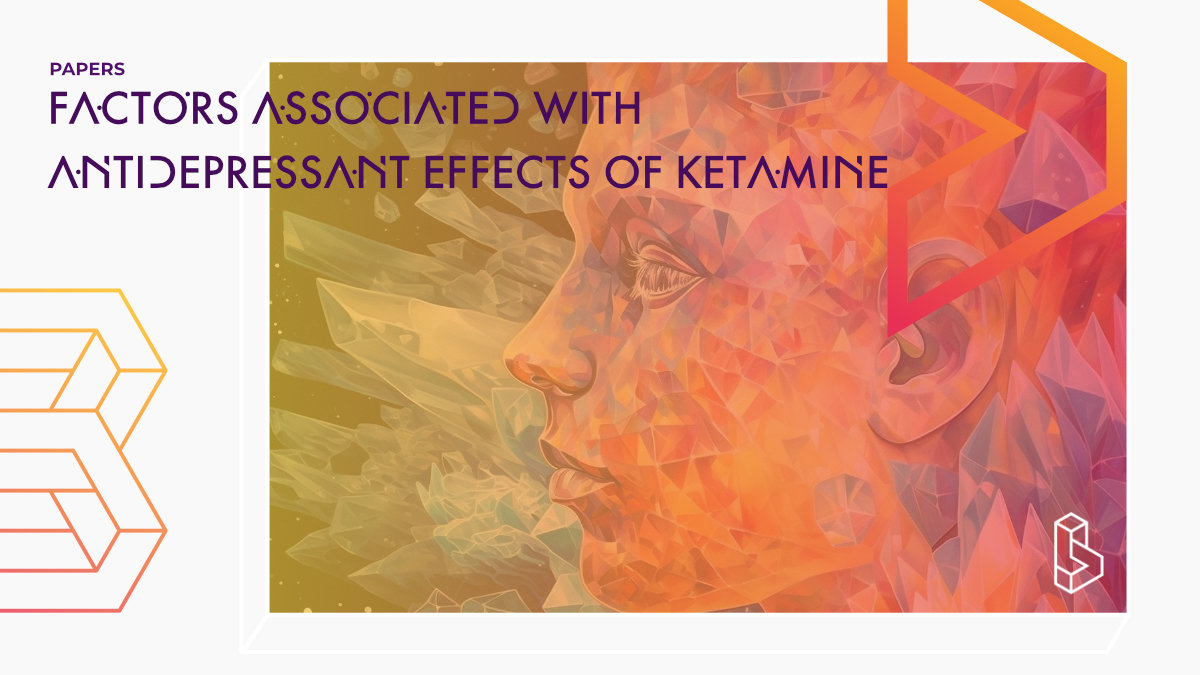This study analyzed data from an RCT (n=31) with treatment-resistant depression (TRD) who received therapeutic doses of intravenous ketamine (35 to 70mg/70kg). The research found that a later onset of depression was positively correlated with a better treatment response to ketamine after three days of administration, suggesting that earlier disease onset may be associated with impaired glutamatergic signal transmission and reduced neuroplasticity, which diminishes the response to ketamine. Other demographic and clinical factors, including age, sex, baseline depression score, and dissociative score, didn’t significantly correlate with treatment response.
Abstract of Factors Associated with Antidepressant Effects of Ketamine: A Reanalysis of Double-Blind Randomized Placebo-Controlled Trial of Intravenous Ketamine for Treatment-Resistant Depression
“Introduction: Predictors of treatment response to intravenous ketamine remain unclear in patients with treatment-resistant depression (TRD); therefore, this study aimed to clarify these predictors using the US National Institutes of Health database of clinical trials.
Methods: Data from a placebo-controlled, double-blind, randomized controlled trial were used to assess the efficacy of intravenous ketamine in adult patients with TRD (NCT01920555). For the analysis, data were used from the participants who had received therapeutic doses of intravenous ketamine (i. e., 0.5 and 1.0 mg/kg). Logistic and multivariable regression analyses were conducted to explore the demographic and clinical factors associated with response to treatment or changes in the Hamilton Depression Rating Scale 6 items (HAM-D-6) total score.
Results: This study included 31 patients with TRD (13 women; mean±standard deviation age, 48.4±10.9 years). Logistic regression analysis showed that the age of onset was positively correlated with treatment response after three days of ketamine administration (β=0.08, p=0.037); however, no association was observed between treatment response and age, sex, baseline HAM-D-6 total score, or dissociative score assessed with the Clinician-Administered Dissociative States Scale 40 min after ketamine infusion. Multiple regression analysis showed that no factors were correlated significantly with the percentage change in the HAM-D-6 total score three days after ketamine administration.
Discussion: Later disease onset correlates with a better treatment response three days after ketamine infusion in patients with TRD. Glutamatergic signal transmission may be impaired in patients with an earlier onset of depression, resulting in decreased neuroplasticity, which diminishes ketamine response.”
Authors: Kengo Yonezawa, Hiroyuki Uchida, Taisuke Yatomi, Yohei Ohtani, Kie Nomoto-Takahashi, Shinichiro Nakajima, Masaru Mimura & Hideaki Tani
Summary of Factors Associated with Antidepressant Effects of Ketamine: A Reanalysis of Double-Blind Randomized Placebo-Controlled Trial of Intravenous Ketamine for Treatment-Resistant Depression
Introduction
Ketamine is a dissociative anaesthetic that antagonizes glutamatergic N-methyl-D-aspartate (NMDA) receptors. It has rapid-acting and robust antidepressant effects in patients with major depressive disorder and bipolar depression.
Several predictors of the efficacy of intravenous ketamine therapy have been reported, including a family history of alcohol use disorder, higher body mass index, lower baseline intelligence quotient, lower pretreatment working memory function, lower adiponectin, higher brain-derived neurotrophic factor, and smaller left hippocampal volume. In a systematic review and meta-analysis of studies evaluating the real-world clinical effectiveness of ketamine in patients with TRD, the mean age was positively correlated with symptom improvement. In contrast, the mean number of failed antidepressants was negatively correlated with remission rates.
Find this paper
https://doi.org/10.1055/a-2179-8884
Open Access | Google Scholar | Backup | 🕊
Cite this paper (APA)
Yonezawa, K., Uchida, H., Yatomi, T., Ohtani, Y., Nomoto-Takahashi, K., Nakajima, S., ... & Tani, H. (2023). Factors Associated with Antidepressant Effects of Ketamine: A Reanalysis of Double-Blind Randomized Placebo-Controlled Trial of Intravenous Ketamine for Treatment-Resistant Depression. Pharmacopsychiatry.
Study details
Compounds studied
Ketamine
Topics studied
Treatment-Resistant Depression
Depression
Study characteristics
Placebo-Controlled
Double-Blind
Randomized
Re-analysis
Participants
29
Humans
Compound Details
The psychedelics given at which dose and how many times
Ketamine 35 - 70mg | 2x
Linked Clinical Trial
Double-Blind, Placebo-Controlled Trial of Ketamine Therapy in Treatment-Resistant Depression (TRD)This study is looking at the efficacy, durability, safety, and tolerability of multiple single doses of Ketamine vs. active placebo for treating patients with treatment resistant depression who are taking an antidepressant that is not working for them.

